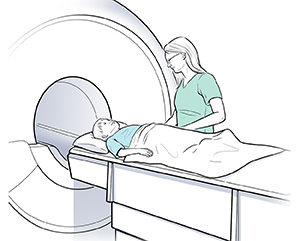When Your Child Has NF2-Related Schwannomatosis (NF2-SWN) )
NF2-related schwannomatosis (NF2-SWN) makes certain nerve cells more likely to develop tumors. Most of these tumors are not cancer (benign). But in very rare cases, they may turn into cancer (malignant). This health problem may also be called neurofibromatosis type 2.
With NF2-SWN, tumors are most often found along the nerves to the ears (auditory nerves). They can lead to hearing loss and problems with balance. Often these tumors happen in both ears. Tumors can also grow along nerves coming out of the brain and spinal cord. Eyesight problems may occur. Your child’s healthcare provider will tell you more about your child’s condition and their treatment choices.
What causes NF2-SWN?
NF2-SWN is caused by a change (mutation) in certain genes that affect nerve growth. This mutation often happens by chance. It can also be passed down in families (inherited). If a child has NF2-SWN, parents and siblings should be checked for the condition, too.
What are the symptoms of NF2-SWN?
Symptoms vary for each child. They can also be hard to recognize during childhood. So the diagnosis is often not made until the child is in their 20s or 30s. The symptoms may also be affected by the location of the tumors. Your child may have:
How is NF2-SWN diagnosed?
Your child will likely see a pediatric neurologist for diagnosis and treatment. This healthcare provider specializes in nervous system problems in children. If the provider thinks your child may have NF2-SWN, your child may have tests such as:
-
Nervous system exam. During this exam, the provider checks how well your child’s nervous system is working. They check your child’s muscle strength, balance, coordination, and reflexes. They also check skills such as hearing or vision.
-
Eye exam. This checks for eyesight changes, cataracts, and eye pressure.
-
Hearing exam. This checks your child's hearing.
-
Health history. The provider will ask about your child’s symptoms, other health problems, and family health history.
-
Imaging tests. These may include an MRI or CT scan to check tumor size and location.
-
Genetic tests. These blood tests check for the gene mutation.
 |
| With NF2, your child may have an imaging test, such as an MRI or CT scan, to check for tumors. |
For your child to be diagnosed with NF2-SWN, they need to have 1 of these:
-
Bilateral vestibular schwannoma. This slow-growing tumor is also known as an acoustic neuroma. It can lead to hearing loss, ringing in the ears, or weak facial muscles.
-
Parent or sibling with NF2-SWN
Or any 2 of these:
How is NF2-SWN treated?
Surgery is often done to remove any tumors. Surgery has many risks and benefits. The healthcare provider will talk about these with you. In rare cases, a tumor can turn into cancer. Your child may then have other treatments like radiation or chemotherapy.
If your child has a hearing problem, they may need a cochlear implant. It can help fix hearing. Your child's provider will go over this surgery if needed.
What are the long-term concerns?
The outcome for your child varies based on how bad their condition is. After treatment, many children can be as active and independent as other children. Other tumors in the nervous system can occur. But they are rare. So your child may need routine checkups.
If a tumor was taken out along the auditory nerve, your child may have lasting hearing loss after treatment. Ask their provider about support care to help your child learn to manage their disability.
To learn more
NF2-SWN is linked to a risk for tumors. These include schwannomas, meningiomas, and low-grade ependymomas. Children with NF2 must be checked often. Doing so helps find tumors at an early stage.
A positive outlook helps while supporting your child. Encourage your child to be active and to try new things. Think about getting counseling. It can help you and your child deal with any fears or concerns. And get help from friends, local resources, and support groups. Learning more about your child’s condition may help you feel more in control. These resources may also help:
-
Children’s Tumor Foundation, ctf.org 800-323-7938
-
National Institute of Neurological Disorders and Stroke, ninds.nih.gov 800-352-9424